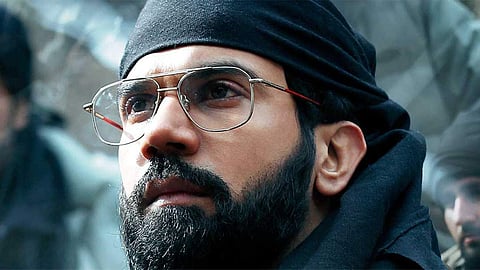

In Omerta, after the 1994 kidnappings of Westerners in New Delhi, Ahmed Omar Saeed Sheikh is shown to be hung upside down in a cell and beaten with a nightstick, repeatedly. The swings don't land on him with the kind of thud and crack we'd usually associate with the breaking of bones and cutting open of skin. A muzzled version of the sound makes its way out of Hansal Mehta's Omerta, the film in which Rajkummar Rao plays Omar, and it comes across as sanitised. Not the real, stinging beating we probably last registered in all their original intent in Vetrimaaran's Visaaranai.
Later in the film, years removed, Omar is dealing with Wall Street Journal reporter Daniel Pearl. I wonder if 'dealing with' is an appropriate phrase here because Pearl is dead. Omar is using a knife, an unwieldy one for the job, and goes about slicing and dicing through skin, flesh, veins, nerves and bones. We don't see it. Mehta takes the aural route - the sounds enter our head and manifest themselves as image - to get us through this scene, the camera never steady, focused on Omar, steadfast in his job as if he is working through something more than just game hen this time because his friends are coming over for dinner.
Cast: Rajkummar Rao, Rajesh Tailang
Director: Hansal Mehta
The two scenes make us wonder if it is a stretch to read into them and say that it was not the same man in those two instances. What happened in the intervening years? Is the film insisting that we went soft on Sheikh? He was given up in exchange for the hostages of Indian Airlines Flight 814, an incident the effects of which are felt even today.
Mehta is fascinated by real world individuals who are closeted in specific unexplored ways, but are expressive and revealing in other momentous ways. Be it Shahid Azmi, the lawyer and activist of Shahid or Aligarh's Ramchandra Siras or Omar Sheikh in Omerta, about whom so much is known and yet a lot of it remains unknown. This characteristic extends at times to the reel world too as Mehta's last film Simran was about an eccentric, often misunderstood protagonist, the people around her forever struggling to keep pace with her. When it comes to Omerta, the obvious companion film is Shahid, with Azmi's life inside and outside the courtroom delineated, as he fights for Muslims wrongly accused of terrorist activities while, here, the protagonist is a militant, a driven calculated individual who is never in doubt about what he is unleashing on the world. We can even treat one as a spin-off of another. Shahid has a scene in Tihar jail where Sheikh meets Azmi and they play a game of chess, something that is ubiquitous in the initial portions of Omerta. Omar Sheikh of Shahid also apologizes for losing his temper during meal time at the prison, because he cannot bear to see his Muslims brothers not keeping their Ramadan fast. In Omerta, we get that scene.
But we get very little about Sheikh's past life in London, where he was studying in LSE when the Bosnia genocide and ethnic cleansing put the brakes on his education. When he reaches Pakistan, he is still the most educated, refined individual among scores of recruits waiting for their training. Rao speaks with a less-than-convincing British accent that comes and goes, but we get Sheikh's fish out of water discomfort when his response to his new companions jibing is, "What's so funny?"
English and Sheikh are inseparable, something that comes in handy for his future operations. Mehta (who shares writing credits with Mukul Dev) does not give us how the LSE student landed up for training in Afghanistan and it is jarring because we never delve into the pre-Bosnia Sheikh. How religious was he before all this? What was his outlook as a student? In Omerta, there isn't a clear line connecting the suddenly sympathetic-of-his-Muslim-brethren Sheikh of London to the Omar Sheikh who berates his prison mates for not observing the Ramadan fast.
Instead we get bullet points of incidents that have run their course on news, TV channels and inspired scores of films in the last 25 years. In Shahid, we got a man's psyche, his struggle with his religion, his piety and what he is made to suffer in the name of it. Of course, Azmi chose the more difficult path, the one that is unpaved and full of hidden dangers. In Omar Sheikh's case, we are dropped right in the middle of the holy war, Sheikh half-convinced to take up the mantle and in the need of just a gentle push. We don't see strong characters that meet Omar to make their cases, whichever side of the debate they might be, the way we get Azmi meeting Omar in Tihar jail. We don't need a film for this. We have three decades and more worth of painful real-world footage.